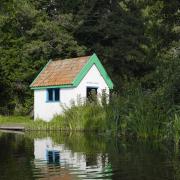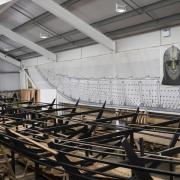It’s a Monday morning. The bells are silent, but there’s a line of people making their way to church in Woodbridge. Tucked under their arms or held out in front of them, they carry this month’s offerings – a kettle, an iron, a food mixer, even a vacuum cleaner. All broken.
There are no pews inside and most of the chairs have been stacked in a corner, but the visitors are directed to one of the many tables around the periphery of the church building.
Behind each one, a volunteer is waiting, poised to solve today’s problem, eager to repair and resolve, to bring new life to what looked set for the dustbin.
This is the Repair Café held at St John’s Church Woodbridge, one of hundreds that take place in villages, towns and cities all over the world after an initiative launched in the Netherlands 15 years ago.
It’s a community project offering friendship and company with tea and cake while sharing advice and expertise, and seeking to counter something of our throwaway culture.
‘We live in a disposable society when if something stops working, many of us will just throw it away and buy a new one,’ says Carol Saunders, one of the founders of this project in Woodbridge.

‘Our main aim with the Repair Cafe is to reduce the carbon footprint.’
There was a community café already running in the church but in 2019 Carol heard about the Repair Café network and wondered if this could work in the town.
Partnering with the community environmental group, Transition Woodbridge, they signed up to receive all the details about running these meetings.
A call for volunteers with DIY, needlework or specialist electrical or engineering skills was met with a great response.
‘People were really enthusiastic,’ says Carol. ‘We had no problem finding repairers and people are still offering to get involved.’
Many of the items can be mended swiftly with a new fuse, a tightened screw, well placed glue or some informed brute force, others take a little longer. But no repair will be undertaken if it looks likely to take more than two hours. And nothing will be repaired here if there are nearby businesses offering the service professionally.

Everybody who brings along a broken item has to be part of the repair process themselves, says Carol.
‘We want to equip people with some of the make-do-and-mend skills that nobody really knows these days.’
It’s a great way to make new friends, too, as the item being mended makes an easy ice-breaker for conversation.
‘The repairers enjoy chatting together and learn from each other,’ says Carol. ‘Some people come here just to watch the repairs, they don’t bring something themselves.’
The Repair Café has been well received and there are now almost a dozen throughout Suffolk including in Bury St Edmunds, Halesworth, Stowmarket and Waldringfield.
In nearby Martlesham, the Repair Café in the village hall prompted a further initiative, launched in 2022, called the Repair Shed which is located in a nearby business unit.
Here bigger repair projects can be undertaken following a slightly different operating model from the cafes.

Projects underway here at the moment include a coffee table which needs a leg replacing, a Bungalow Bill clockwork fireman who needs help climbing up his ladder, a dolls house, lots of radios, steam irons and toasters, a breadmaker and a laminator.
‘We have a number of former BT engineers, many of whom have brains the size of planets,’ Moray says of the volunteers who also help with other nearby Repair Cafes.
‘They’re amazing with televisions and laptops. Then there are others, like me, who can offer mechanical solutions, and we have others who can sew. There are about 20 volunteers on our rota but typically between five and eight will turn up for our four sessions a week and we have fun – tea and biscuits while we solve the latest problem.’
Moray believes around three-quarters of the items brought into the Repair Shed are returned to their owners in working order, saved from the tip and reducing the carbon footprint. But there’s lots the volunteers can’t do, he says.
‘Hair straighteners are a good example of the problem. If they were screwed together, you could take them apart, replace the element and they’re mended. But the cheaper versions are glued together so when they stop working there’s nothing you can do, they have to be thrown away.’
There are issues regarding built-in obsolescence by manufacturers, constant product upgrades, unavailability or expense of spare parts, and specialist equipment needed to carry out the repair. ‘We have collected probably 200 different types of screwdrivers in order to get into all the security bolts some of these manufacturers put on,’ says Moray.
We are all part of the problem in wanting to buy cheap products, he says. ‘As soon as you change something from being a clip to a screw, it becomes more expensive.’
But we can all be part of the solution, too, by not throwing things away so readily and learning how to mend things when they are damaged or go wrong.
‘If we can all do a small thing,’ says Carol, ‘it can make a big difference.’
For more information, visit www.repaircafe.org and www.suffolkrecycling.org.uk



























